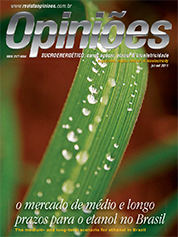Haroldo Borges Rodrigues Lima
Director-General of ANP
Op-AA-29
The solution will be found
Ethanol’s share in the Brazilian energy matrix is experiencing a defining moment. In March of this year, Provisional Bill 532 was enacted changing the definition of ethanol from an agricultural sub-product to an energy product, while submitting its production, import, export, transference, transportation and storage to the regulations of ANP (national oil, natural gas and biofuels agency).
This government measure, which was an old expectation of the fuel industry and also of many sugarcane producers, in itself would suffice to foster the debate on the future of ethanol. However, other factors have contributed to encourage the debate on ethanol in Brazil. From 2003 to 2009, the number of flex-fuel light commercial vehicles – that can run on gasoline or ethanol –, increased from just over 48,000 to about 2.6 million.
Flex-fuel cars now represented 92.3% of domestic sales of light commercial vehicles in 2009, in comparison with 39% in 2003. Currently, flex-fuel vehicles already make up 45% of the national fleet and, according to predictions of Unica (Sugarcane Industry Association), this figure will be 65% already in 2015.
One must add to these two factors the economic growth the country has enjoyed in the last nine years. Millions of people, who previously were not even able to open a bank account, nowadays can obtain financing to buy their first automobile. All this resulted in a tremendous increase in demand, which, in combination with last year’s drought, caused a shortfall in the sugarcane harvest and forced Brazil to import ethanol for the first time in many years.
The importation did not even represent 1% of the national production, but it lit the yellow light. Brazil must find a way to conciliate economic growth and the increased participation of flex-fuel vehicles in order to warrant that no shortages will occur in the country.
For this to take place, it is necessary to provide the sugar and ethanol industry the means to grow, fostering the construction of new mills, provided such investment also implies the reduction in price volatility of anhydrous ethanol in the off-season. In my opinion, this discussion is only just beginning.
At the time when I am writing this article, the news is that republican and democrat senators have reached an agreement to do away with the tariff on the import of Brazilian ethanol and the US industry’s subsidies on ethanol from corn – which industry is much less competitive than ours in terms of price and energy generation – at the end of the current month.
It would be frustrating at this point in time, when the outlook is so favorable in the domestic and foreign markets, that Brazil should have to forgo taking advantage of this scenario due to the lack of a coherent policy for the industry, conciliating national interests with the aspirations of investors to increase business and profits.
The current situation of overall growth of the economy and of fuel consumption made evident the limitations of our sugarcane plantation area, i.e., the relative minuteness of our sugarcane plantations. Actually, quite to the contrary, rather than growing, in the 2011/2012 harvest, the area used for sugarcane plantations decreased.
That is why the increase in investments in plantation areas, as well as in mills, has become a preliminary issue for the growth of the ethanol production in synchronization with the demand, and for placing the product at the level required for it to be an export product.
I do not intend to propose miraculous solutions in this article. Among all countries of the world, Brazil is the one with the least limitations to expand its agricultural frontier. Nowadays, we are using less than 2% of the area available for agriculture.
This means we can increase our planted area without causing damage to the environment, while going about an unnecessary and criminal deforestation. We also have the advantage of being ahead in terms of technology, whose development is the object of ever growing investments.
We, at ANP (national oil, natural gas and biofuels agency), will take the measures needed to allow for making use of all advantages we have to benefit the country. I trust the solution will be found soon and I am optimistic when I see the discussion on a policy for ethanol as fuel gaining such remarkable space, like in this magazine.




